
| 
One of the most innovative aspects of THE SANKORE FOUNDATION program’s rests in the scope and range of the SANKORE University curriculum. SANKORE Volunteer & SANKORE Indigenous Knowledge Study (IKS) curriculum creates opportunities to meet, live, and learn from and with the local people of Northern Ghana. SANKORE University Volunteer 100 level, IKS 200 level, and IKS 300 level “courses” are designed to be flexible in order to help you choose what works best for you and to tailor your experience in Ghana and the duration of it (from one week until up to one year) to your liking. Come share with SANKORE for a couple of months during summer break after college finals, give the gift of exposure and experience to your graduating high school senior, or couple the SANKORE Volunteer and IKS course experiences with the contextual knowledge you’re absorbing during your leisure or academic study. The  choice is yours and the options are limitless. choice is yours and the options are limitless.
Volunteer with SANKORE University & The People of Ghana
SANKORE Volunteer 100 Level course possibilities (minimum of one month in northern Ghana) include volunteer opportunities in the teaching hospital (Volunteer 100 - Hospital), in education (Volunteer 101 - Primary & Secondary Schools), and at the University of Development Studies (Volunteer 102 - UDS). Detailed illustrations are contained below:
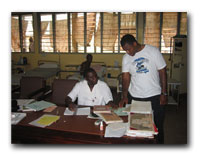
- Volunteer 100 - Volunteering at Tamale Teaching Hospital (medical background may be required) within the:
- Physiotherapy Department
- Labor and Maternity Ward
- Pediatric Ward
- Gynecology and Obstetric Ward
- Operating/Surgical Theaters
- Orthopedic
- Anesthesiology
- Outpatient Department (OPD)
- Pharmacy
- Medical Emergency Department
- Hematology, Pathology, Bacteriology, Cytology, & Blood Bank Departments
- X-Ray
- Assisting in the activities of the Ghana Federation of Traditional Medical Practitioners (GHAFTRAM) and assist AIDS patients
- Volunteer 101 - Volunteering at Tamale Metropolitan Education Directorate.

- Tamale Girls Senior Secondary School
- Ghana Senior Secondary School
- Tamale Senior Secondary School
- Business College International
- Teaching and/or assisting at the Taimako Business College (age: 15-22 years)
- Teach young people basic computer literacy and Internet skills at Technocef, a private institution in Tamale.
- Care for orphaned children at the Anfaani Tamale Children Home
- Co-op in the mango arboricultural Agrovet/Taimako Farms and Nurseries (only in the summer). Grow, seed, plant, graft trees, fruits, and much more.
- Volunteer 102 - Volunteering at the University of Development Studies (founded Sept. 1993, the largest faulty of agriculture in Ghana). Participate in
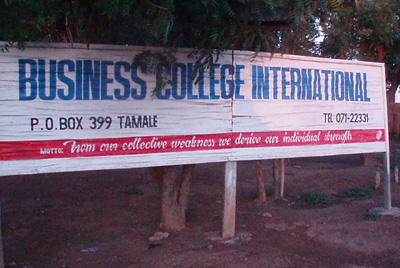 collaborative research, student exchange research, community facilitation & Intervention within the: collaborative research, student exchange research, community facilitation & Intervention within the:
- Dept. of Agronomy – Dept. Head Israel Dzomeku Ph.D
- Dept. of Animal Science – Dept. Head G. Ayum Teye Ph.D.
- Dept. of Horticulture – Dept Head Mr. Hypolite Bayor
- Dept. of Agriculture Eco Economics and Extension – Mr. A. S. Iddi
- Dept. of Agriculture Mechanization and Irrigation Technology – Kranjae B. Gordana Ph.D
- Dept. of Renewable Natural Resources – Mr. William Asante
- Dept. of Biotechnology – Demuyakor Ph.D.
- Tuition (exchange of lectures). Minimal qualifications of lectures must have Masters in field
- And other non-governmental organizations a
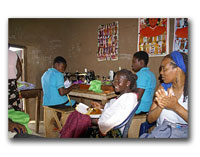 nd development partners nd development partners
- Volunteer 103 – Traditional Professions
- Weaving
- Midwifery
- Drumming
- Dancing
- Sewing
Participate in these volunteer opportunities while living in traditional Ghanaian villages or compounds and actively participating in traditional Ghanaian daily activities. On weekends SANKORE University will also help organize outings (may be additional cost) to visit as many as 7 historic and vivid sites throughout Northern Ghana while completing your “coursework” at SANKORE University. These sites include:

- Paga Alligator Park
- Pikoworo Salve Camp
- Sirugu Art Center
- Tenzu Shrine
- Techiman Monkey Central
- Salago Slave Market
- Mole Park
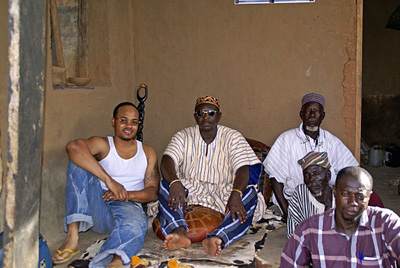 Precept with Sankore University, Chief & Elders of Ghana Precept with Sankore University, Chief & Elders of Ghana
Please note!
IKS 200 & 300 courses are an advance level curriculum and reserved for those individuals who are genuine and experienced in indigenous, traditional religion, and spiritual matters.
SANKORE IKS 200 level courses are more tour based. IKS 200 & 201 are 5 day excursions designed specifically to tie into group campaigns that may have been organized primarily to visit the southern part of Ghana, but recognize the historical, cultural, and spiritual significance of the North and would like to experience that wonder.
- IKS 200 – Gateway to the North, Cultural
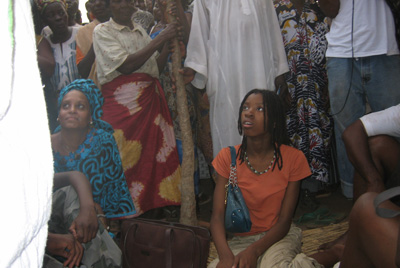
- Day 1 – arrival in the north
- Day 2 – travel to Bolga (capital of Upper East Region), Pikworo, Bongo
- Day 3 – culture exchange
- Day 4 – travel to Tamale (capital of the Northern Region)
- Day 5 – depart
- IKS 201 –Gateway to the North, Spiritual
- Day 1 – arrival in the north
- Day 2 – travel to Bolga (capital of Upper East Region), Pikworo, Bongo
- Day 3 – culture exchange
- Day 4 – travel to Tamale (capital of the Northern Region)
- Day 5 – depart
Please see About Us | Contact Us page
for full itinerary and inquiries
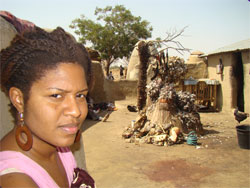 IKS 300 level courses includes a rites of passage program and/or apprenticeships whereby enrollees will study traditional religion, medicine, herbal formulations, and spiritual philosophy in partnership with the Ghana Federation of Tradition Medical Practitioners (GHAFTRAM) and its network of over 1800 traditional healers. Sankore University’s collaboration with GHAFTRAM and the Ghana Psychic and Traditional Healers Association will ensure that your African traditional religion experience is authentic, beyond expectations, and in the truest sense of the expression…life changing! IKS 300 level courses includes a rites of passage program and/or apprenticeships whereby enrollees will study traditional religion, medicine, herbal formulations, and spiritual philosophy in partnership with the Ghana Federation of Tradition Medical Practitioners (GHAFTRAM) and its network of over 1800 traditional healers. Sankore University’s collaboration with GHAFTRAM and the Ghana Psychic and Traditional Healers Association will ensure that your African traditional religion experience is authentic, beyond expectations, and in the truest sense of the expression…life changing!
- IKS 300– Rites of Passage
- Tungteeya (Proverb – Beginning of A Good Thing)
- Day 1 – Arrival – All Day
- Day 2 – Accra/ElminaTour
- Sungdiba (Helpers)
- Bongni (Where The Roots Are)
- Day 4 –Tamale – Arrival In The North
- Day 5 – Culture Exchange
- Day 6 – Culture Exchange
- Day 7 – Travel to Bolga/Pikoro/Bongo
- Day 8 – Life In The Traditional Village – Day of Rebirth
- Day 9 –Life In The Traditional Village
- Day 10 – Life In The Traditional Village
- Day 11 – Travel to Bolga/Tamale
- Tuhimiya (Go Back & Mentally Fight for Victory)
- Day 12 – Relax & De-centrate In Tamale
- Day 13 – Hit The Road To Accra
- Day 14 – Travel Back To U.S.
- IKS 301– Divination Fellowships
- Includes portions of Rites of Passage but all activities are at the full discretion of the elders
- IKS 302 – African Spirituality Fellowships
- Includes portions of Rites of Passage but all activities are at the full discretion of the elders
Please see About Us | Contact Us
for full itinerary and inquiries
The Northern sectors of Ghana are reverend for the depth, scope, and power of the traditional religion in practice. Please do your research. You will discover that there are for more traditional healers than modern medical doctors per capita in the north. Traditional medicine is a way of life and Sankore University allows you to tie right in!
Due to the social, political, and unfortunately economic isolation of the North, the regions have also been less affected by the influences of foreign religious practices, interpretations, and dogma. Obviously, a lengthy or even relatively brief IKS course will expand the spirit of Pan-Africanism through the acknowledgement of the common trans-Atlantic link, kindred, lineage, and ancestry.
As with Sankore Volunteer, experience these indigenous opportunities while living in traditional Ghanaian villages or compounds and actively participating in traditional Ghanaian daily activities. One weekend Sankore will also help organize outings to visit as many as 7 historic and vivid sites threw out all of Northern Ghana while completing your SANKORE University course curriculum. These sites include:
- Paga Alligator Park
- Pikoworo Salve Camp
- Sirugu Art Center
- Tenzu Hills & Tango Shrine
- Techiman Monkey Central
- Salago Slave Market
- Mole Park
Please see About Us | Contact Us
for full itinerary and inquiries

It is true that African Americans were captured, kidnapped, and taken by strangers to a strange land. Naturally, this catastrophe has had great and lasting affects on the psychology of African Americans. Several people are blamed for these unfortunate events, however, very little has been done operationally by either Africans or African Americans to help lessen the pain and lasting psychological effects caused by the slave trade. SANKORE is pioneering the active engagement of real solution oriented efforts to address and resolve the horror of slavery and its lingering mental effects. The time and 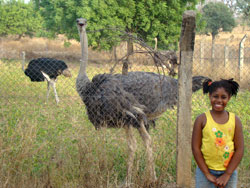 environment is ideal for the genesis of a realistic model designed for the African American community to develop a real appreciation and knowledge of its own culture. SANKORE is positioned to fill the cultural void within our communities and replace it with a healthy confidence and strong sense of IDENTITY. environment is ideal for the genesis of a realistic model designed for the African American community to develop a real appreciation and knowledge of its own culture. SANKORE is positioned to fill the cultural void within our communities and replace it with a healthy confidence and strong sense of IDENTITY.
Back to top
SANKORE UNIVERSITY - TESTIMONIALS
SCROLL OVER EACH PICTURE TO VIEW THE TESTIMONIALS OF THESE INDIVIDUALS
Diane, Ghana - March 2007

Back to top
Matilda X, Ghana - March 2007
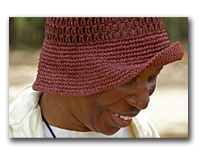
Back to top
TAIMAKO FARMS PHOTO GALLERY
SANKORE UNIVERSITY GALLERY
STAGES IN LIFE
In any traditional society in Ghana, the growth of man is marked by stages.  These are the stages – birth, puberty, marriage, death and life after death. These stages are termed the Life Cycle. After birth, the baby grows through the puberty stage into a young adult and then adulthood. The adult then marries, brings forth children, grows old and dies. After death he moves into the next world. Some religious rites and ceremonies are performed for each stage. There are rites and ceremonies for birth, puberty, marriage and death. These are the stages – birth, puberty, marriage, death and life after death. These stages are termed the Life Cycle. After birth, the baby grows through the puberty stage into a young adult and then adulthood. The adult then marries, brings forth children, grows old and dies. After death he moves into the next world. Some religious rites and ceremonies are performed for each stage. There are rites and ceremonies for birth, puberty, marriage and death.
Back to top
PROVERBS, RIDDLES AND PUZZLES
What Proverbs Are and Their Significance in Ghanaian Languages?
A proverb is a short, wise saying. Proverbs play a very important role in the everyday language of the Ghanaian. Our languages have beautiful proverbs, which cover all aspects of our life. They are drawn from careful observations of social events, the lives of people and animals. Some are also drawn from experiences in occupations such as farming, fishing, hunting and weaving. We have proverbs that talk about family and human relations, good and evil, poverty and riches, joy and sorrow.
Back to top
CHIEFTANCY
Chieftaincy in Ghana is the system of ruling in the traditional Ghanaian society. The  common term for a “ruler” is chief. It is the term used for every grade of ruler in the traditional setting. common term for a “ruler” is chief. It is the term used for every grade of ruler in the traditional setting.
The chief is the first citizen of the town or village. As the ruler of the town or village, the chief has other office-bearers under him. Under them are other office bearers. The authority gets down until the ordinary citizen or subject is reached.
Back to top
FESTIVALS
Significance of Ghanaian Festivals
In Ghana, there are different types of festivals. These festivals 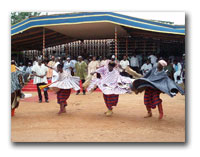 differ from community tocommunity.Festivals are very important occasions on the traditional calendars of the various traditional areas. All the festivals have political, social and religious significance for the people who celebrate them. They are celebrated for many reasons. differ from community tocommunity.Festivals are very important occasions on the traditional calendars of the various traditional areas. All the festivals have political, social and religious significance for the people who celebrate them. They are celebrated for many reasons.
Back to top
Traditional Religious Beliefs and practices
The traditional religion teaches that there is God and this God is a spirit and is supreme.  To show he exists, the traditional man uses the expression, “One does not show the child God.” To show he exists, the traditional man uses the expression, “One does not show the child God.”
Back to top
VALUES AND SOME SPECIFIC VALUES
Meaning of Values
Values mean standard or ideas, which most people have about the worth of good qualities such as kindness, freedom, mercy, respect and love. There are moral and social values.
Back to top
|

